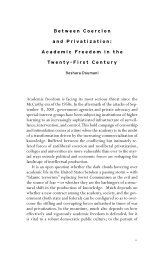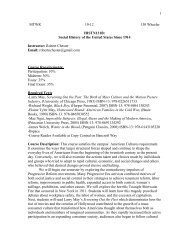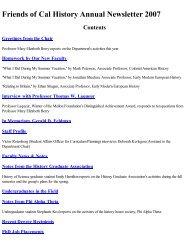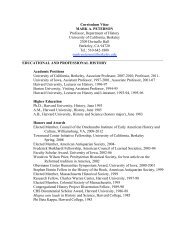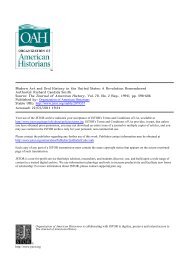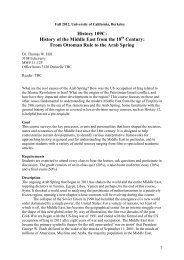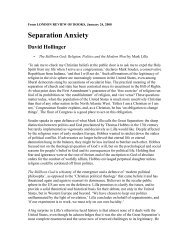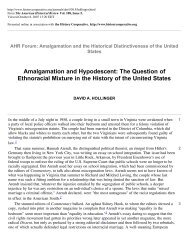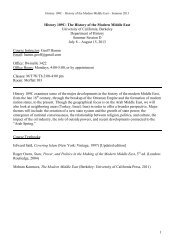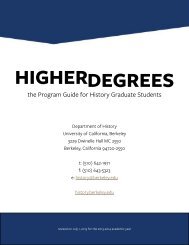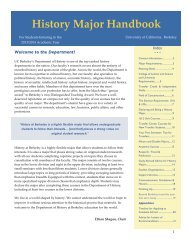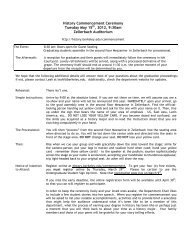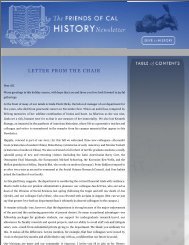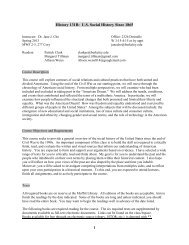My Grandmother and Other Stories: Histories of the Palestinians as ...
My Grandmother and Other Stories: Histories of the Palestinians as ...
My Grandmother and Other Stories: Histories of the Palestinians as ...
Create successful ePaper yourself
Turn your PDF publications into a flip-book with our unique Google optimized e-Paper software.
dilemma <strong>of</strong> what to do when <strong>the</strong> wall w<strong>as</strong> completed, pre-empting <strong>the</strong> forced move<br />
with a ‘voluntary’ displacement for academic re<strong>as</strong>ons.<br />
Abu Rami, an 82-year-old Armenian Christian, w<strong>as</strong> one <strong>of</strong> <strong>the</strong> most veteran<br />
inhabitants <strong>of</strong> <strong>the</strong> neighbourhood. In 2003, he suffered a stroke. With <strong>the</strong> news about<br />
<strong>the</strong> wall, he became obsessed with p<strong>as</strong>sages <strong>and</strong> gates, <strong>and</strong> how long it would take to<br />
p<strong>as</strong>s through <strong>the</strong>m in c<strong>as</strong>e <strong>of</strong> emergency. In despair, he too left <strong>the</strong> neighbourhood,<br />
moving into his son’s apartment in <strong>the</strong> Old City <strong>of</strong> Jerusalem. Jack, his son, will in<br />
turn move to a new apartment that his wife inherited from her recently-dece<strong>as</strong>ed<br />
fa<strong>the</strong>r, a death that came just in time to spare Abu Rami his anxieties. Abu Rami’s<br />
daughter Arij, a pr<strong>of</strong>essor at Bethlehem University, will be leaving <strong>the</strong> neighbourhood,<br />
too. Between <strong>the</strong> wall enclosing <strong>the</strong> neighbourhood <strong>and</strong> that confining Bethlehem, she<br />
chose <strong>the</strong> latter evil. There, at le<strong>as</strong>t, she h<strong>as</strong> access to her college.<br />
Abu Musa is a sort <strong>of</strong> villain in Dhahiat al-Barid. The same age <strong>as</strong> Abu Rami, he<br />
recently recovered from a heart attack. From time to time, his two sons who live<br />
in <strong>the</strong> US send him generous sums <strong>of</strong> money, fulfilling <strong>the</strong>ir filial duty. Like many<br />
o<strong>the</strong>r well-to-do <strong>Palestinians</strong>, he exp<strong>and</strong>ed his property, erecting a four-story building<br />
consisting <strong>of</strong> eight large apartments. These he rented out for $480 each, <strong>the</strong> most<br />
expensive apartments in <strong>the</strong> neighbourhood. He w<strong>as</strong> known for being selective in<br />
choosing his tenants. He wouldn’t rent to large families or to khalayla (people from<br />
Hebron), who have an undeserved reputation <strong>as</strong> troublemakers. He w<strong>as</strong> strict with his<br />
tenants. Payment on time w<strong>as</strong> his first rule. No noise <strong>and</strong> no touching <strong>the</strong> t<strong>as</strong>ty fruit<br />
in his garden were his second <strong>and</strong> third. He w<strong>as</strong> known to be miserly, not returning<br />
change, <strong>and</strong> his tenants learned to pay him <strong>the</strong> exact amount. The only currency<br />
he accepted w<strong>as</strong> dollars. His renters were small families–a physician, a lawyer, an<br />
accountant, a journalist <strong>and</strong> two people working for international companies <strong>and</strong><br />
organizations.<br />
His tenants were <strong>the</strong> first to leave <strong>the</strong> neighbourhood with <strong>the</strong> construction <strong>of</strong> <strong>the</strong><br />
wall. The whole building emptied out, a very sad change even for those who didn’t<br />
like Abu Musa. One day I <strong>as</strong>ked him what had happened to his renters. To where did<br />
<strong>the</strong>y disappear? He liked <strong>the</strong> questions <strong>and</strong> started lecturing me about <strong>the</strong> importance<br />
<strong>of</strong> sumud (‘steadf<strong>as</strong>tness’). “We <strong>Palestinians</strong> shouldn’t leave every time we face a<br />
problem with <strong>the</strong> Jews,” he told me. “We shouldn’t give up quickly. This is how we<br />
lost Palestine,” he argued <strong>as</strong>sertively. I am not sure he meant every Palestinian or even<br />
every inhabitant <strong>of</strong> <strong>the</strong> neighbourhood, but for sure he meant those who rented his<br />
apartments. It is totally legitimate to wrap an income <strong>of</strong> $4,000 a month in <strong>the</strong> patriotic<br />
language <strong>of</strong> sumud.<br />
Two weeks later I learned that Abu Musa himself had just left <strong>the</strong> building <strong>and</strong> moved<br />
to his house in <strong>the</strong> Old City <strong>of</strong> Jerusalem. When we met sometime later, I <strong>as</strong>ked him<br />
[ 114 ] FEATURES The Palestinian ‘Wailing Wall’



